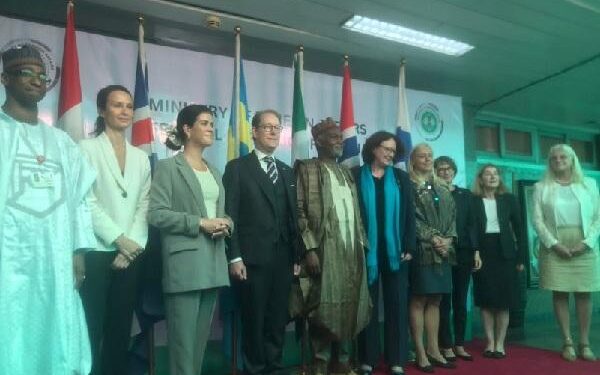In a significant step towards strengthening regional representation, the Nordic Council has announced the inclusion of Greenland, the Faroe Islands, and Ă…land in its Presidium. This reform marks a pivotal moment in Nordic co-operation, ensuring that the voices of these autonomous territories carry greater weight in the council’s decision-making processes. The move reflects ongoing efforts to enhance inclusivity and collaboration across the Nordic region, highlighting the evolving political landscape within this unique inter-parliamentary body.
Greenland Faroe Islands and Ă…land Take Seats in Nordic Council Presidium Enhancing Regional Representation
The inclusion of Greenland, the Faroe Islands, and Ă…land in the Nordic Council Presidium marks a significant step towards a more balanced and inclusive regional governance structure. This historic move acknowledges the unique cultural and political identities of these autonomous territories, granting them a direct voice in the Council’s decision-making processes. By empowering these regions, the Presidium strengthens the overall Nordic cooperation and promotes a deeper understanding of distinct local perspectives that shape policy formulation across the North Atlantic and Baltic Sea areas.
This expansion of representation is expected to bring several benefits to the Nordic region, including:
- Enhanced dialogue: Facilitating more robust exchanges on issues like climate change, sustainable development, and indigenous rights.
- Greater visibility: Amplifying the concerns and contributions of smaller Nordic communities on the international stage.
- Improved policy integration: Ensuring that regional policies better reflect the diverse social and economic realities across the Nordic territories.
These changes embody the Nordic Council’s commitment to inclusivity and democracy, aligning governance with the evolving geopolitical landscape while fostering unity within diversity.
Implications for Nordic Cooperation Strengthening Autonomy and Inclusivity in Decision Making
The recent inclusion of Greenland, the Faroe Islands, and Ă…land in the Nordic Council Presidium marks a significant step toward amplifying regional voices and shaping a more balanced decision-making process. This development reinforces the commitment to strengthening autonomy within the Nordic cooperative framework, fostering a governance model that truly reflects the diverse geopolitical realities of its members. By integrating these territories directly into the Presidium, the Nordic Council not only honors their distinct cultural and political identities but also ensures that policy considerations are more inclusive, agile, and directly responsive to their specific needs.
Beyond enhancing autonomy, this reform promotes a deeper sense of inclusivity and shared responsibility across the region. Key implications include:
- Increased dialogue and collaboration on indigenous and local issues.
- More equitable resource allocation and strategic prioritization across all member territories.
- Stronger representation of smaller communities at the highest decision-making levels.
- Enhanced transparency and participation through diversified leadership.
| Aspect | Before Reform | After Reform |
|---|---|---|
| Representation | Limited to Nordic countries only | Includes autonomous regions in Presidium |
| Decision-making | Centralized and less diverse | Decentralized and inclusive |
| Autonomy Support | Consultative roles | Active policy influence |
| Cultural Recognition | Symbolic | Substantive and institutionalized |
Recommendations for Fostering Deeper Integration and Equitable Policy Development
To truly harness the potential of Greenland, the Faroe Islands, and Ă…land joining the Nordic Council’s Presidium, it is essential to elevate mechanisms that promote mutual understanding and shared objectives. Establishing dedicated working groups focusing on cultural exchange and sustainable development can bridge existing gaps and ensure that unique regional concerns are adequately represented in policy dialogues. Strengthening digital collaboration tools will also facilitate continuous communication, fostering a dynamic environment where ideas flow seamlessly across borders.
Prioritizing equitable policy development means embedding transparency and inclusivity at every step. This can be achieved through:
- Regular public consultations in all member regions to gather grassroots insights
- Implementing impact assessments that consider diverse socio-economic and environmental factors unique to each territory
- Providing capacity-building programs that empower local representatives to engage effectively within the Presidium
| Key Focus Area | Example Initiative | Expected Outcome |
|---|---|---|
| Cross-Cultural Exchange | Annual Nordic Youth Forums | Enhanced mutual understanding |
| Policy Transparency | Open-access legislative tracking | Increased accountability |
| Local Capacity Building | Interactive training workshops | Stronger regional advocacy |
In Summary
The inclusion of Greenland, the Faroe Islands, and Ă…land in the Nordic Council Presidium marks a significant step toward deeper regional collaboration and representation within Nordic governance. This reform underscores the commitment of the Nordic countries to ensure that the voices of all member regions are heard at the highest levels of decision-making. As the Nordic Co-operation evolves, this expanded leadership structure promises to strengthen ties across the region and address shared challenges more effectively. The coming months will reveal how this renewed framework shapes the future of Nordic unity and policy development.
















